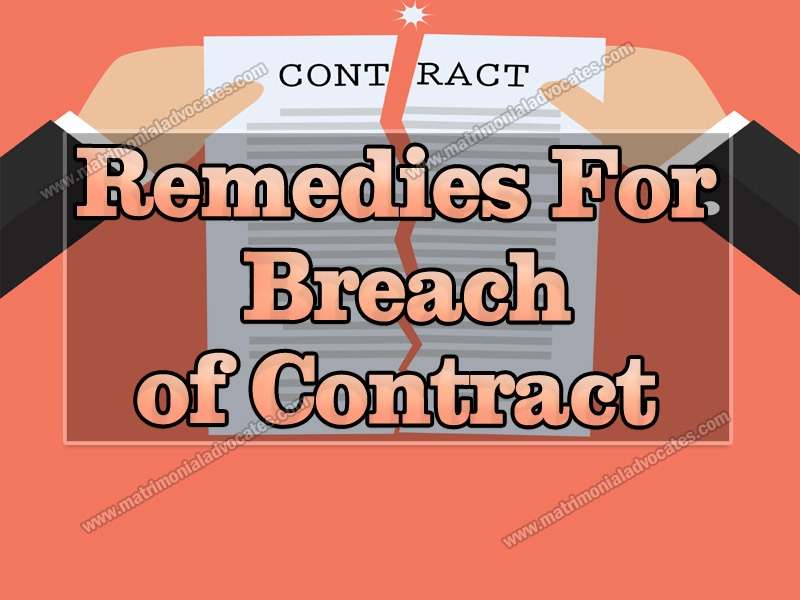
The present article discusses about the Breach of Contract and various remedies available to the aggrieved party for the Breach of Contract.
CONTRACT
A contract is an agreement enforceable by law. Contract means legally binding agreement reached between two partners and it should contain terms over which courts have the authority and obligation to enforce.
BREACH OF CONTRACT
‘Breach of Contract’ means failure to perform the Contract and ‘Remedy’ which means any of the methods available at law for the enforcement, protection, or recovery of rights or for obtaining redress for their infringement. When either of the parties breaches the contract, it gives right to the other party to sue him for remedy. A right without remedy is of no avail, therefore, must provide for the remedies available to persons if their rights are violated.
Section 37 of the Indian Contract Act states that -The parties to a contract must either perform, or offer to perform, their respective promises, unless such performance is dispensed with or excused under the provisions of this Act, or of any other law. —The parties to a contract must either perform, or offer to perform, their respective promises, unless such performance is dispensed with or excused under the provisions of this Act, or of any other law.” Promises bind the representatives of the promisors in case of the death of such promisors before performance, unless a contrary intention appears from the contract.
REPUDIATION
As per the section 39 of the Indian Contract Act, repudiation occurs where the party has refused to perform or disabled himself from performing, his promise in its entirely, the other party may put an end to the contract, , unless that other party has expressly or impliedly signified its consent for the continuance of contract. If the other party chooses to put an end to the contract, the contract is said to be broken and amounts to breach of contract by the party not performing or refusing to perform its promise under the contract.
CHALLENGES BEFORE THE PARTIES
- The foremost challenge for the aggrieved party to prove that there has been a legal breach of contract and for the other party to prove otherwise.
- The second challenge becomes one for the other party, to prove that there had been such acquiescence.
- The third challenge is one for the aggrieved party. They need to prove that there has been repudiation. Every deviation or departure from the terms of the contract would not be repudiation. Repudiation would need an intentional denial to fulfill contractual obligations.
- REMEDIES
There are basically two categories of remedies available for a breach of contract:
A) Common Law Remedy
B) Equitable Remedies
COMMON LAW REMEDY
- DAMAGES
This category of remedy includes Damages. The fundamental principle underlying damages is ‘not punishment but compensation’. The main purpose of damage is to provide Monetary Compensation to the non-breaching party. These are calculated on the basis of looking at what the position of the plaintiff would have been if the Contract had been properly performed.
TYPES OF DAMAGES
- Ordinary/Compensatory Damages:
These are damages, which arise naturally and directly in the usual course of things, from the breach of contract itself. In other words, ordinary damages are restricted to the direct and proximate consequences of the breach of contract.
Hadley v. Baxendale [1854] EWHC J70
The plaintiff was a mill owner. He entrusted a broken shaft, to the defendant, who was a carrier, to be delivered to the maker as a pattern for a new one. The defendant was only told that the broken shaft was a part of the machinery and ought to be replaced. Due to some neglect on the part of the defendant, the delivery of the shaft was delayed. As a result, the mill remained closed and the plaintiff lost profits as a part of damages. Held that the plaintiff was only entitled to recover damages, which arose in the usual course of things from such breach. Thus, the plaintiff was entitled to recover damages for the delay in delivering the broken shaft. Since the defendant was not informed, that the mill had to be kept idle, till the shaft was replaced, the plaintiff was not justified in claiming loss of profits.
- Consequential/Special Damages:
These damages arise on account of the special/usual circumstances affecting the plaintiff. They are such remote losses, which are not the natural and probable consequences of the breach of contract. These can be claimed only if the special circumstances, which would result in special loss in case of breach of contract, are brought to the notice of the other party, at the inception of the contract itself.
- Liquidated Damage:
These are the damages to which parties to a contract agree in advance if the contract is breached. To be lawful, the actual damages must be difficult or impracticable to determine, and the liquidated amount must be reasonable in the circumstances.
- Nominal Damages:
These damages are awarded when the non-breaching party sues the breaching party even though no financial loss has resulted from the breach. These are neither awarded by way of compensation to the aggrieved party nor by way of punishment to the guilty party. Usually these are awarded in a small amount such as Rs. 200.
- Damages for Inconvenience and Discomfort
Damages can be recovered for substantial inconvenience of discomfort resulting from breach of contract.
- Exemplary/ Vindictive Damages
These damages are awarded with a view to punish the erring party for the breach and not by way of compensation for the loss suffered by the aggrieved party. Exemplary damages are awarded only in two exceptional cases:
- Breach of Contract to marry.
- Dishonor of a cheque by a banker, when there is sufficient funds to the credit of the customer.
- Statutory Damages:
Statutory damages are a damage award in civil law, in which the amount awarded is stipulated within the statute rather than being calculated based on the degree of harm to the plaintiff. Lawmakers will provide for statutory damages for acts in which it is difficult to determine a precise value of the loss suffered by the victim.
EQUITABLE REMEDIES
These are discretionary remedies at equity and are only granted where damages are not an adequate remedy.
Rescission:
It is a right available to the injured party which does not requires intervention of the court. It entitles the injured party to set aside the contract and is only available for breach of a condition. Substantial restoration must be possible as the injured party is restored to their pre-contractual position. A rescinded contract is terminated from the beginning – as though the contract never existed, so a rescission requires that all parties be brought back to the position they were in before entering into the contract. This means any benefit received as part of the contract, such as money, must be returned.
Restitution:
Restitution means to return goods or property received from other party to rescind the contract. It is based on the concept of unjust enrichment and sometimes referred to as quasi-contracts. Under this the plaintiff must establish that the benefit to the defendant was at the plaintiff’s expense and it would be unjust to allow the defendant to keep that benefit or enrichment. The defendant must have a benefit or enrichment and should not have a defense to rely upon.
Specific Performance:
It is a remedy compelling performance. It is only granted at the court’s discretion where the court can supervise the implementation of the contract. The Courts direct the defendant to perform the contract, and in accordance with its terms. By contrast to civil law systems that generally regard the innocent party’s primary resource as, in principle, to have the contract performed, the jurisdiction to order specific performance is supplementary to the common law remedy of damages. Notwithstanding this difference of principle in ‘practice, even in civil law systems, specific performance is only granted if the innocent party has a specific interest in performance which is not satisfied by damages.
Injunction:
It is a restraining order which prevents a person from breaking a contract. It is a discretionary remedy and aims at enforcing negative promises. It normally cannot be used where it would achieve the same result as specific performance. The courts exercise their power to issue injunctions judiciously, and only when necessity exists.
Quantum Meruit:
Quantum Meruit determines the amount to be paid for services when no contract exists or when there is doubt as to the amount due for the work performed but done under circumstances when payment could be expected. This may include a physician’s emergency aid, legal work when there was no contract, or evaluating the amount due when outside forces cause a job to be terminated unexpectedly.
REMEDIES UNDER INDIAN CONTRACT ACT, 1872
Section 73: Compensation for loss or damage caused by breach of contract- When a contract has been broken, the party who suffers by such breach is entitled to receive, from the party who has broken the contract, compensation for any loss or damage caused to him thereby, which naturally arose in the usual course of things from such breach, or which the parties knew, when they made the contract, to be likely to result from the breach of it.The Supreme Court held in the case of
Pannalal Jankidas v. Mohanlal AIR 1951 SC 144 that the party in breach must make compensation in respect of the direct consequences flowing from the breach and not in respect of loss or damage indirectly or remotely caused.”
Section 74: Compensation for breach of contract where penalty stipulated for-
When a contract has been broken, if a sum is named in the contract as the amount to be paid in case of such breach, or if the contract contains any other stipulation by way of penalty, the party complaining of the breach is entitled, whether or not actual damage or loss is proved to have been caused thereby, to receive from the party who has broken the contract reasonable compensation not exceeding the amount so named or, as the case may be, the penalty stipulated for.
Section 75: Party rightfully rescinding contract entitled to compensation- A person who rightfully rescinds a contract is entitled to compensation for any damage which he has sustained through the non- fulfillment of the contract.
CONCLUSION
It can be concluded that there are various remedies available in case of Breach of Contract however in order to avail these remedies there are few challenges before the party like to prove that there has been a breach of contract and the other being to prove the repudiation of the contract.
Nevertheless whatever remedies are available, it has always uplifted the rights of the aggrieved party in a breach of contract and there is always a scope of evolution of a new remedy depending upon the peculiarity of the case.





